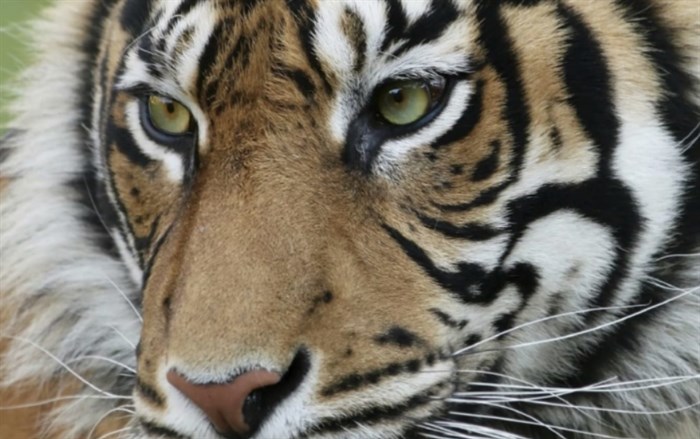
Tigers are a hot topic these days.
Image Credit: SUBMITTED / BC SPCA
April 03, 2020 - 9:15 AM
Self-isolating audiences have been immersing themselves in the Netflix series Tiger King in an attempt to avoid existential dread and it's prompted the B.C. SPCA to issue a statement.
“Lately, exotic cats have been trending for all the wrong reasons and we want to answer your questions to help protect these majestic animals in the wild and ensure those in captivity have lives worth living,” said the organization that’s been advocating for the protection of wild cats for decades, especially for exotic cats who have been bred and sold as pets and for public display, in a press release.
“In North America, exotic cats like tigers, lions, cheetahs, jaguars, leopards and servals have been bred in captivity and sold for private possession or exchanged by zoos. Despite being bred and raised in captivity, these wild animals still keep their natural instincts as predators and pose significant safety issues to their keepers and the public.”
The B.C. SPCA said the animal welfare needs of these species in captivity are extremely difficult to meet as they require specialized diets, enrichment and veterinary treatment, considerations for social groups, and some need vast spaces to roam.
Here's the B.C. SPCA's Q&A on all things to do with wild cats:
Is it legal to own an exotic wild cat in Canada?
In B.C., since the introduction of provincial Controlled Alien Species legislation in 2009, it is illegal to privately own a large exotic cat. The B.C. SPCA worked with the government for years to ensure B.C. has the most restrictive protections for exotic animals in Canada.
Accredited zoos are allowed to house these species under permit.
Elsewhere in Canada, it depends on provincial restrictions and municipal bylaws.
What is the difference between a zoo and a sanctuary?
Most people think of a zoo as a facility that houses wild and exotic animals for display to the public and may participate in breeding programs. A sanctuary to some might mean a place where animals spend the rest of their lives – regardless of whether it’s open to the public or not or the animals are allowed to breed – but in fact there is no legal definition of either in Canada.
How much space does a tiger or lion need in captivity?
Home ranges in the wild vary based on prey availability but for tigers, it can be in the range of hundreds of kilometres and for lions, it can go up to thousands of kilometres. However, just because captive big cats are fed by their keepers does not mean they no longer need the space.
In fact, the larger the natural home range, the greater the likelihood of stereotypes (repetitive behaviours like pacing) that come from boredom and frustration. Like whales and dolphins in captivity, we know that there is no ideal size for space and phasing out of keeping these animals in captivity should be the goal.
Are there really more tigers in captivity than there are in the wild?
Yes. Estimates of wild tigers are close to 3,800 while tigers in private captivity in the United States alone are over 5,000. Worldwide, the number of captive tigers is unknown.
Can captive tigers or lions ever be released back to the wild?
No. Wild tiger and lion populations require pure genetic lineages to sustain their natural populations – so the focus needs to be on habitat protection, poaching and trophy hunting to protect them.
Those cats bred and sold for private possession have unknown genetic lineages and would never be suitable for species survival plans for reintroduction. Further, captive tigers and lions raised by hand would not have the skills to survive in the wild.
Can handling, cuddling and petting tigers make them domesticated?
No. A tiger is a tiger is a tiger. Hand raising wild kittens may allow for increased contact when young, but it takes thousands of years to domesticate animals. Also cub petting tourism can drive the need to produce cubs regularly, creating an overpopulation of adults in captivity, leading to even more suffering.
To read more of the B.C. SPCA's insights on wild cats go here.
To contact a reporter for this story, email Kathy Michaels or call 250-718-0428 or email the editor. You can also submit photos, videos or news tips to the newsroom and be entered to win a monthly prize draw.
We welcome your comments and opinions on our stories but play nice. We won't censor or delete comments unless they contain off-topic statements or links, unnecessary vulgarity, false facts, spam or obviously fake profiles. If you have any concerns about what you see in comments, email the editor in the link above.
News from © iNFOnews, 2020